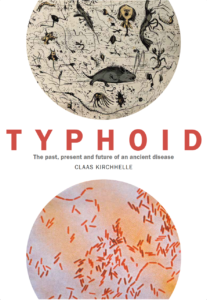

Typhoid – The past, present and future of an ancient disease
(Scala, 2022)

A killer of paupers, princes and presidents, typhoid was an invisible threat in Victorian times and remains dangerous in many areas today.
In this exploration of the past, present and future of typhoid control, Dr Claas Kirchhelle uses the stories of both literary characters and real-life figures to trace typhoid’s transformation from a mysterious scourge into a controllable microbial threat. Drawing on the award-winning Typhoidland exhibitions, the author dispels the myth of typhoid as an eradicated disease and shows how cutting-edge vaccines and collective international action offer new hope amidst surging drug resistance – a subject that has gained new relevance in a post-COVID world.
The book is available for purchase here: https://scalapublishers.com/typhoid/
All royalties go to the Oxford Vaccine Group.
“Claas Kirchhelle brings the story of typhoid to life in this compelling narrative taking us from the early medical references through the dawn of microbiology, the first use of immuno-diagnostics to the amazing power of modern vaccines to control this ancient killer. It is a book that meticulously observes the story and the science behind the discoveries that underpin modern understanding of infectious disease, on which our very lives depend.” ― Prof Sir Andrew Pollard, FMedSci, Director, Oxford Vaccine Group
“Typhoid is one of the classic diseases of humankind that has been with us, perhaps since humans moved out of Africa. It still persists in many places, particularly where public infrastructure is weak and impoverished. The disease has killed many significant people in history, and has imprinted on our way of thinking. This book provides a unique and eloquent discription of the disease and its continuing impact. Very relevant in the modern interconnected world.” ― Prof Gordon Dougan, FRS, FMEDSCi, Department of Medicine, University of Cambridge, Wellcome Sanger Institute.
“This lively illustrated account gives typhoid the prominence it deserves and links the past with the present.” ― Dr Margaret Pelling, Centre for the History of Science, Medicine, And Technology, University of Oxford.
“Kirchhelle’s book leaves us contemplating the future of infection prevention and control, not just the future of typhoid.” ― The Lancet Infectious Diseases


